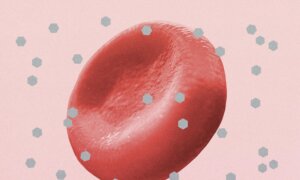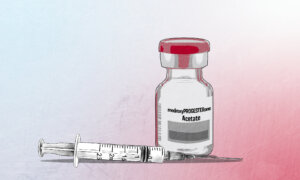The more scientists research the effects of breastfeeding, the more benefits they identify for infants. Some advantages extend past infancy into childhood and even have a potential effect on adult health.
A recent study found that breastfeeding for at least 6 months was associated with fewer delays in reaching social, language, and motor developmental milestones. It was also linked to a reduced likelihood of neurodevelopmental conditions that can cause disability.
The findings build on earlier studies from recent years associating breastfeeding with a lower likelihood of allergies, asthma, high blood pressure, and infant death.
“It is widely known that ‘breast is best’ and that babies who are fed breastmilk have fewer infections, less allergic diseases, healthier GI [gastrointestinal] tracts, and so much more,” Dr. David Berger, a board-certified pediatrician not involved in the study, told The Epoch Times in an email.
Breastfeeding and Developmental Delay Protection
The
study, conducted in Israel and published in JAMA Network Open, involved 570,532 children, including 37,704 sibling pairs. To determine the effect of breastfeeding on development, researchers collected data from national health clinics on routine child development monitoring and records of national insurance disability entitlements.
Earlier research, such as this study published in PLOS One, has suggested an association between breastfeeding and improved cognition, but it involves confounding factors, making it difficult to draw firm conclusions. Confounding factors are variables that can skew the accuracy of results.
For this reason, the Israeli study carefully adjusted for confounders. In this case, the researchers adjusted for factors that affect the baby, such as birthweight and child order in the family, as well as those that affect the mother, such as age and marital status.
The sibling pairs helped rule out some confounders because siblings often receive similar levels of parental dedication. After eliminating confounders, the researchers hypothesized that the benefits of longer breastfeeding may stem from the effects on the microbiome (the community of microbes in the gut) and structural and connectivity differences in the brain, based on imaging.
With regard to clinical outcomes, social and speech neurodevelopmental conditions included ADHD, autism, and severe behavioral disorder—a mental health issue that manifests in actions such as property destruction and self-injury. Motor neurodevelopment conditions included paralysis, malfunction of two limbs, and cerebral palsy, a disease marked by a lack of muscle coordination usually caused by brain injury before or at birth.
Additionally, the collected data associated “exclusive” breastfeeding with a lower risk of developmental delays and neurodevelopmental conditions than “nonexclusive” breastfeeding. “Exclusive” referred to feeding solely through breastmilk during 6 months, while “nonexclusive” denoted a combination of breastfeeding and bottle-feeding during the research period.
The study adds to the body of research in two ways, lead author Inbal Goldshtein of the KI Research Institute in Kfar Malal, Israel, told The Epoch Times. It achieved strict control of confounders or interfering factors, and the results allowed for high generalization to other populations, as they are based on broad, representative population samples, she said.
Berger, pediatrician and founder and owner of Wholistic Pediatrics & Family Care, said that the study’s control of confounders and the large number of children, including many sibling pairs, make it impressive. He feels that the results suggest breastfeeding duration has more impact than exclusivity. “To me, this study suggests that the length of breastfeeding may be more important than whether a baby receives some formula.”
The American Academy of Pediatrics (AAP) recommends exclusive breastfeeding for the first 6 months of life. The AAP also advises continued breastfeeding and complementary foods introduced at 6 months for as long as the child and mother desire it for 2 years or more.
Underlying Mechanisms
Mechanisms underlying the benefits are multifaceted, including nutrition, movement, and psychological factors.
Nutrition Factors
“Child development is based in the brain,” said study coauthor Dr. Deena Zimmerman, a certified pediatrician and the head of the Maternal Child and Adolescent Department at the Ministry of Health of Israel. She told The Epoch Times in an email that fatty acids in breastmilk are part of the building blocks of brain tissue. During the early years of rapid growth of the brain, new tissue is being built. When the source of the growth is breast milk, the brain is better conditioned to build new synapses—the basis of learning and development.
Breast milk is far superior in nutritional value to infant formula, said Dr. Robert Freedman, professor of psychiatry and pharmacology at the University of Colorado School of Medicine.
“It has much higher amounts of choline and other nutrients critical for continued brain development after birth,” he told The Epoch Times in an email. Choline is a neuroprotectant—a substance that protects nerve cells—that is vital for the functioning of the early brain, as it is required for synthesis of white matter called the myelin sheath.
All the beneficial constituents of breastmilk, including hormones, bioactive compounds, and fatty acids, also influence brain development, cognition, and emotional development in an indirect manner, Demi Lucas, international board-certified lactation consultant, told The Epoch Times in an email. They support immunity and a healthy gut microbiome, which is increasingly recognized as influencing brain function and behavior.
Movement as Medicine
“We talk about food as medicine, but breastfeeding involves movement as medicine—a repetitive, functional exercise that builds the foundation for all gross and fine motor development, speech, breathing, and social interaction,” Emily Spaeth, an internationally board-certified lactation consultant, told The Epoch Times in an email.
Spaeth, founder and CEO of Be Well Baby PDX, said breastfeeding is much more complex, nuanced, and challenging than bottle feeding. It requires babies to use a coordinated suck-swallow-breathe pattern, engaging the tongue, jaw, lips, soft palate, and the entire body in ways that bottle-feeding doesn’t. This motion strengthens muscles, refines motor skills, and helps shape the hard palate, leading to better alignment of teeth and airway development.
The intricate muscle work of breastfeeding promotes tongue mobility, which is essential for clear speech later on, according to Spaeth.
“Babies who rely on bottles, especially if they develop compensatory sucking patterns like chomping, may not get the same tongue and jaw training needed for optimal articulation,” she said.
Aside from exercising muscles in the mouth and throat, breastfeeding is a full-body experience that integrates sensory-motor input, facial nerve stimulation, and vagus nerve activation, according to Spaeth.
“The proprioceptive (awareness of movement) and tactile (touch) feedback from suckling helps fine-tune motor pathways, which contribute to improved coordination and even social engagement. If you think about it, when we as adults are calm and happy and have well-regulated nervous systems, we are more likely to be socially engaged, too,” she said.
Psychological Factors
“Breastfeeding releases oxytocin in both mother and baby, which is a hormone crucial for social bonding, emotional regulation, and stress resilience,” Lucas said. “Higher oxytocin levels may promote social engagement.”
The physical closeness, eye contact, and interaction during breastfeeding reinforce attachment, emotional security, and early communication skills, all of which are foundational for social development, she said.
“These psychological factors, together with constituents of breastmilk, may help protect against or reduce behaviors associated with social disorders, such as autism spectrum disorder,” Lucas said.
Other Breastfeeding Benefits
Asthma Protection
The benefits of breastfeeding for the gut microbiome also apply to the microbiome in the nasal passages, which has implications for respiratory health. A
study published in Cell used a database to examine the breastfeeding characteristics and gut and nasal microbiomes of 2,227 children.
The researchers found that stopping breastfeeding early, defined as before the baby is 3 months old, was associated with the early acquisition of microbes that link to asthma. In contrast, longer exclusive breastfeeding is linked to acquiring microbes that protect against asthma.
Allergy Protection
A
study published in The American Journal of Clinical Nutrition noted that breast milk is associated with a reduced risk of allergies—including food allergies, asthma, and atopic dermatitis—itchy, inflamed skin. The factors underlying the benefits are not fully known, but the authors hypothesized that molecules in breast milk called microRNAs may be responsible. To determine the effect, they analyzed 432 human milk samples and 7,824 weeks of longitudinal health data.
The results indicated that the intake of a microRNA from breastmilk called miR-375–3p for six months corresponded to a reduced risk of food allergies, wheezing, and atopic dermatitis during the first year of life. MicroRNAs are stable enough to reach the infant gut, where they are absorbed and boost the immune system, thereby reducing the risk of allergy-related conditions. Infant formula does not contain microRNAs, but according to the study authors, the addition of synthetic ones might eliminate the allergy-risk differences between breastfed and formula-fed infants.
Lower Blood Pressure in Early Childhood
Breastfeeding in infancy corresponds to reduced cardiovascular disease risk in adulthood, according to a
study published in the Journal of the American Heart Association. However, because the duration of breastfeeding needed to confer this benefit is unknown, the authors evaluated data on early-life feeding and blood pressure involving 2,382 children.
The results showed that breastfeeding, regardless of exclusivity or duration, is associated with lower blood pressure at age 3, including breastfeeding limited to only the first few days of life. The finding is significant because blood pressure tracks from early childhood to adulthood.
In speculating on the underlying factors, the authors said changes in the gut microbiome from breastfeeding may affect atherosclerosis (hardening of the arteries) later in life. Nutrients and compounds, such as stem cells in colostrum, the first milk produced after birth, may influence cardiovascular development and have long-lasting benefits. Additionally, colostrum is rich in n‐3 long‐chain polyunsaturated fatty acids—important structural components of the tissue lining blood vessels.
Lower Infant Death
Breastfeeding has been linked to lower infant death rates. A
study published in the American Journal of Preventive Medicine investigated the associations on a state and regional level. It involved 10 million U.S. infants born between 2016 and 2018. The findings showed that breastfeeding was associated with lower death rates, ranging from 21 percent in the Southeast to 44 percent in the Northeast and mid-Atlantic regions.
Breastfeeding Support Is Available
While breastfeeding offers well-documented benefits, it’s important to acknowledge that children who receive formula can thrive with proper care and nutrition, said Berger. For those who choose to breastfeed, support is available for its challenges.
“I always encourage families to get breastfeeding support when needed because guidance can make a meaningful difference in a successful breastfeeding journey,” Berger said.
Spaeth said that breastfeeding support can include education and therapy.
“That’s where skilled bodywork, oral function assessments, and movement-based interventions come in,” she said.













